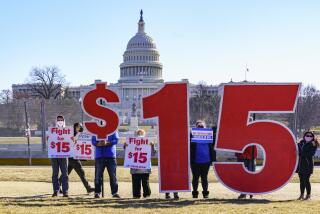Greenberg on the Minimum Wage
- Share via
After reading Paul Greenberg’s column (“Minimum Wage Hike a Maximum Blunder,” Op-Ed Page, Sept. 9) decrying the terrible effects of the minimum wage, I remembered hearing those same arguments when I was a teen-ager in the 1930s. Great disaster would overtake us if we paid a minimum wage to people for their presence eight hours a day.
Greenberg refers to eminent economists who make these dire predictions, which is one of the reasons they have been frequently called the dismal scientists. Also dismal is their record of forecasting.
The main question, however, is that the minimum wage is not an economic question, but a moral question. Judgments about its propriety are moral judgments just like the judgment about the number of hours people should work a week. Since the 1930s we, as a nation, have decided that 40 hours was about right. Economists could easily argue that if we all worked 50 hours a week for the same pay that prices could be lower or productivity higher.
Greenberg says that the restaurant business will have to fire people or raise prices. Not if they reduce profits or reduce rent paid.
While economic and market relations are important, it is still society’s prerogative to intervene where they achieve undesired results. After all, we did intervene in the economy more than 100 years ago and abolish slavery. And where would our banking system be today if the government hadn’t intervened and created the Federal Deposit Insurance Corp.?
ROBERT C. MASON
Simi Valley
More to Read
Inside the business of entertainment
The Wide Shot brings you news, analysis and insights on everything from streaming wars to production — and what it all means for the future.
You may occasionally receive promotional content from the Los Angeles Times.










